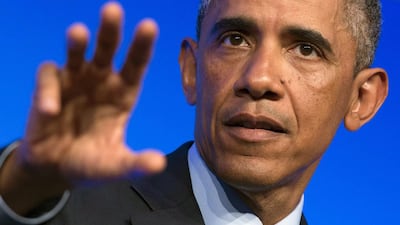NEW YORK // Barack Obama formally asked the United States Congress on Wednesday to pass a new legal authorisation for military action against ISIL extremists that would be limited to three years.
The draft bill also opens the door for US combat forces in Syria and Iraq in “limited circumstances” while prohibiting “enduring offensive ground combat operations”.
The White House draft appeared to be an attempt to tread the middle ground between the demands of Republican hawks who have criticised Mr Obama for not committing enough resources to fight ISIL and Democrats who have been deeply wary of entering another conflict in the Middle East just as the US president has tried to draw 14 years of war to a close.
For opposite reasons, legislators from both parties have called on Mr Obama to seek their cooperation in drafting the new law, and though the White House has said it is already on firm legal footing in launching attacks on ISIL, it appears to be finally acceding to those demands.
In a letter delivered to legislators on Wednesday, the US president asked congress to pass into law an authorisation drafted by the White House that “would provide the flexibility to conduct ground combat operations in other, more limited circumstances, such as rescue operations involving US or coalition personnel or the use of special operations forces to take military action against ISIL leadership”.
The White House draft would also allow US special forces advisers working with Iraqi forces to take a more involved role on the front lines of the war against ISIL, which US military commanders have been calling for.
“It would also authorise the use of US forces in situations where ground combat operations are not expected or intended, such as intelligence collection and sharing, missions to enable kinetic strikes, or the provision of operational planning and other forms of advice and assistance to partner forces,” the letter stated.
In an ironic twist, Mr Obama’s draft skewed much closer to the position of Republicans, who have virulently opposed every other White House initiative but who appeared to largely support the proposal.
“I appreciate the president following the long tradition of seeking authorisation for the use of military force from Congress,” Republican Senator Bob Corker, the chairman of the senate foreign relations committee, said in a statement.
“It also will be important that the president exert leadership, lay out a clear strategy for confronting the threat posed by ISIL, and do the hard work of making the case to the American people why this fight is necessary and one we must win.”
While Mr Corker said his committee would quickly begin hearings on the draft, there is expected to be a prolonged, perhaps months-long, debate in congress over the language of the bill and its parameters.
The White House draft would not limit the fight to Iraq or Syria and requests the authority to fight not only ISIL, but also “associated persons or forces”, wherever they may be, according to the draft bill, which defines such forces as “individuals and organisations fighting for, on behalf of, or alongside ISIL or any closely-related successor entity”.
Such flexible language is precisely what Democratic lawmakers want to avoid, and Mr Obama will face a much more difficult task convincing his fellow party members, who have been voicing their frustration with the president’s draft over the past week as the White House consulted with Capitol Hill.
If approved, the law would repeal the 2002 war authorisation passed by congress that allowed the invasion and occupation of Iraq. The new law would end in 2018 and require the next US administration to take up the debate again before the law expires.
But the draft does not address one of the central reasons why Democrats — including, in the past, Mr Obama himself — have called for a new war law: repealing of the 2001 authorisation granted by congress that the George W Bush administration and current White House have relied upon to conduct military operations against Al Qaeda and its affiliates across the world, and now against ISIL.
Critics say the law is too wide-reaching and has been stretched far beyond its original intent, allowing for constitutionally questionable military action, such as drone strikes against US citizens without due process.
“I look forward to engaging Congress and the American people in efforts to refine, and ultimately repeal, the AUMF’s [2001 authorisation of military force] mandate,” Mr Obama said two years ago. “And I will not sign laws designed to expand this mandate further.”
Democratic critics allege that by not repealing the 2001 law, and by passing an additional, wide-reaching, authorisation, Mr Obama is doing the opposite of what he promised.
tkhan@thenational.ae

